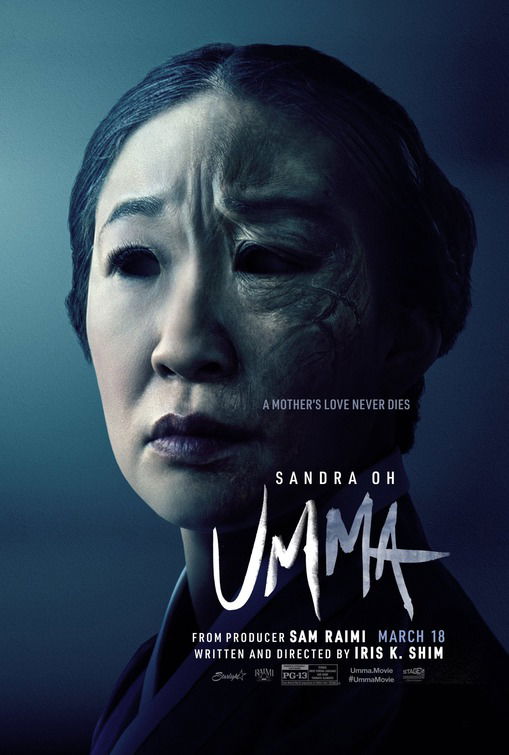“Overcoming Fear”

| None | Light | Moderate | Heavy | |
|---|---|---|---|---|
| Language | ||||
| Violence | ||||
| Sex | ||||
| Nudity |
What You Need To Know:
UMMA’s story revolves around the idea that vengeful ancestral spirits may lay claim to their offspring if not ritually appeased. As Amanda tells her daughter: “Some Koreans believe life’s hardships are caused by the tormented spirits of their ancestors, so they make offering to appease their tormented souls.” UMMA stands out from today’s cinematic chillers as a more thoughtful, culturally relevant movie. However, it fails to maintain consistent tension. UMMA suffers from a mixed worldview of overcoming evil versus pagan superstition, plus brief foul language. So, MOVIEGUIDE® advises extreme caution.
Content:
Mixed worldview with pagan superstition about death and moral elements about overcoming evil and protecting ones daughter
Three obscenities (including one “f” word)
Depiction of child abuse in the form of electrocution via an old lamp, a woman being dragged several yards by a piece of clothing and then suffocated by the same garment before passing out, woman is “possessed” by the spirit of her mother and dragged into a grave where she performs a self-exorcism before crawling out, and two women slap one another
No sex
No explicit nudity, but a woman is seen lying naked in a bathtub (only her back, shoulder and arms are visible)
Two adults drink a beer together
No smoking or drugs;
A mother hides many aspects of her past from her daughter.
More Detail:
A Korean immigrant, Amanda, lives a secluded life with her daughter Chrissy on a remote farm. Where she keeps bees, sells honey and lives without many forms of modern technology, including electricity. Amanda is particularly fearful of electricity, to the point that thunderstorms and the accompanying lightning are truly traumatic for her.
When her uncle arrives with the ashes and prized possessions of her mother, Amanda must confront the demons in her past and present to save herself and her daughter from repeating history and falling prey to the vengeful spirit of her abusive “umma,” (or “mother” in Korean). However, facing her fears in this way carries twin perils. First, she may not be able to bury the past as easily as she would like. Second, the mother-daughter dynamic Amanda had with her mother may disturbingly reflect her relationship to her daughter Chrissy.
UMMA stands out from the crowd of today’s cinematic chillers as a more thoughtful and culturally relevant film. The story of a woman truly wronged by a parent in her youth and her attempt to escape this and make a home for her daughter is a very human tale with which to grab viewers. Also, the theme of the danger of repeating the sins of a parent and the need for self-awareness in this regard is quite powerful.
However, as gripping as the story and themes of the movie are, UMMA fails to maintain consistent tension and is therefore uneven in its delivery. It also makes a less effective use of jump scares in comparison with similar films, such as 2013’s THE WOMAN IN BLACK. This is not to say that UMMA isn’t worth watching. Sandra Oh’s performance, upon whose character so much hangs, is very close to a tour de force. Her inner struggle against becoming like her mother is palpable and disturbing. Her defiance of her mother’s demonic insistence that, “We started as one, and we will end as one,” is compelling. Her portrayal of a mother determined to overcome internal and external forces of evil, her realization of how the sins of the mother may be unintentionally repeated, and her determination to combat this, is the movie’s chief strength. It’s regrettable that few of Oh’s co-stars give her much help in making UMMA memorable.
The movie’s few obscenities, which include one “f” word, keep the movie watchable and don’t strongly detract from the story being told. The film’s themes and content call for discretion regarding older children, however. Despite the absence of any sexual content, there are several disturbing acts of violence including child abuse in the form of electrocution via an old lamp, a woman being dragged several yards by a piece of clothing and then suffocated by the same garment before passing out, and an example of a woman being possessed by the spirit of her mother and dragged into a grave before she’s able to free herself by performing a self-exorcism. The story revolves around the idea that vengeful ancestral spirits may lay claim to their offspring if not ritually appeased. As Amanda puts it, “Some Koreans believe life’s hardships are caused by the tormented spirits of their ancestors, so they make offering to appease their tormented souls.” As the story unfolds, this view is shown to be reality, rather than “superstition,” as Amanda at first believed.
UMMA suffers from a mixed worldview of overcoming evil versus pagan superstition. For this reason, MOVIEGUIDE® advises extreme caution.


 - Content:
- Content: 





